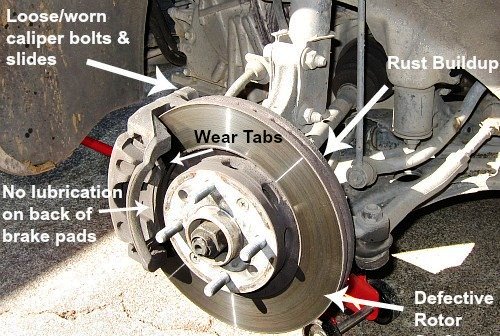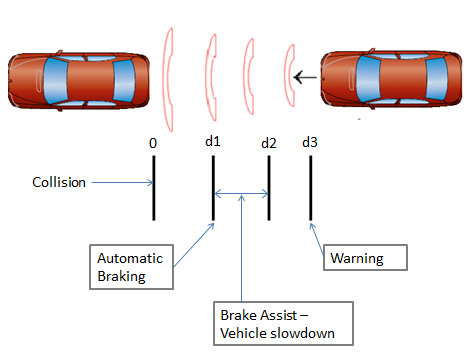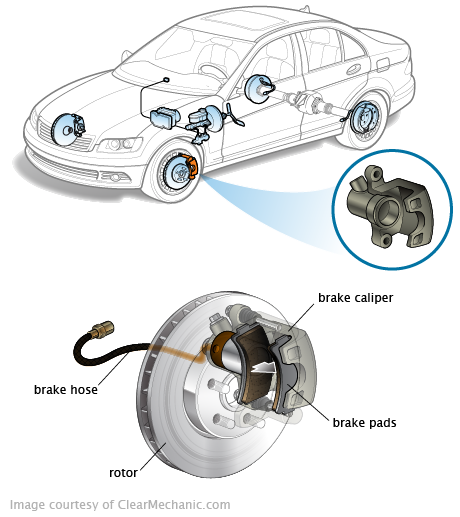Posted on 6/23/2025

When it comes to vehicle safety and maintenance, brake pads are among the most critical components. After replacing your brake pads, it’s tempting to hit the road immediately, especially if you have a long trip planned. However, we recommend waiting at least a week—or driving a certain distance—before embarking on a lengthy journey. Here’s why this break in procedure, recommended by Raybestos, is essential for your safety and the longevity of your braking system. By the way, check out this great getaway in NYS! Understanding the Break-In Period New brake pads require a break-in period to ensure optimal performance and safety. This process, often called &l ... read more
Posted on 3/29/2016

You may not think about your brakes often however there's a stiff penalty for that: BRAKE FAILURE!...and NYers, you more than any other city, need to remember you have special conditions that wear out brakesmush sooner than any city in Idaho, Nebraska, Albany, Tuscany...think "severe driving conditions." While other systems in your vehicle can be forgiving in that they will continue to work and it won't keep your car from starting, the really scary thing to keep in mind is once your brakes go, you may not be able to stop which will certainly hurt someone, something or perhaps kill pedestrians, kids, yourself or your own family, etc. There's no point in saying "brakes last 1-2 years" or the wear out in 10,000 miles. That's not the way it is, at least, not here in the Big Apple, NY, USA. Here are some factors that make that kind of advice dumb and dangerous for we NYers: 1) do you ride your brakes rather than adjust your speed for road and traffic conditions? 2) you live in NYC and, as ... read more
Posted on 3/22/2016

Automatic Braking System coming to all new cars in less than 8 years! Automatic emergency braking or AEB systems a standard feature on practically all new vehicles sold in the U.S. by 2022 according to a new plan from the National Highway Traffic Safety Administration and the Insurance Institute for Highway Safety. Automatic brakes are designed to stop a vehicle before it collides with a car or another object. Experts say that making them standard could prevent as much as 20 percent of accidents. AEB systems are usually coupled with another tech breakthrough called "forward collision warning" which scans the road ahead then warns the driver if the car is about to crash. This allows drivers to take action to slow down the car or completely stopping the car. The AEB system will react when the driver cannot or does not take the needed action to avoid a collision. How's it ... read more
Posted on 2/8/2016

Advice from the 106 St pros... We bet you thought the word is caliber, right? As in .45mm? Hey, we're from the 'hood, too, so we understand. However, the word is caliper and each brake has one but does your ride have 2 or 4. That depends on type of braking system you have. Check your owners manual if you don't know. Don't have it, download it by Googling year, make and model for your car bible. Brake calipers are one of several important parts composing your braking system, and, for God's sake, this is NYC. Queens epitomizes the "severe" driving conditions we speak of often here in this blog...crowded roads, stop and go traffic, sudden stops, NYers in a rush to dart out into traffic to test your brakes and sue your you know what, etc. Pass this test, friends, don't leave home without a good braking system. The combinations of brake pads and brake calipers perform a huge safety task. They change your vehicle's motion to a stop...a fast stop, a screechin ... read more
Posted on 12/8/2015

Give Your Brakes a Break! The life of your brakes is very much within your control. Use common sense and the info you get here to change ingrained habits. 106 St Tire & Wheel loves to save you money, you are our peeps...save money, live long and prosper! 1-High speed driving and brake life: <= well, the last statement is contradictory in terms. Your brakes will have a short life span if you are one of those people who drives like the above. Your own life span maybe shortened as well. We could give you an extensive physics explanation about the energy brakes dissipate during high speed stops but come on now lets use common sense. If you want a long brake life watch the fast stops at high speed and avoid stop and go (that will be difficult in NYC's "severe" traffic congestion) and use common sense, do not ride your brakes! Slow down which means adhering to the new NYC speed limit which is 25 miles, and, you bet, you are on the radar with "photo enforced" scrutiny ... read more